句型转换
- 格式:doc
- 大小:32.00 KB
- 文档页数:3
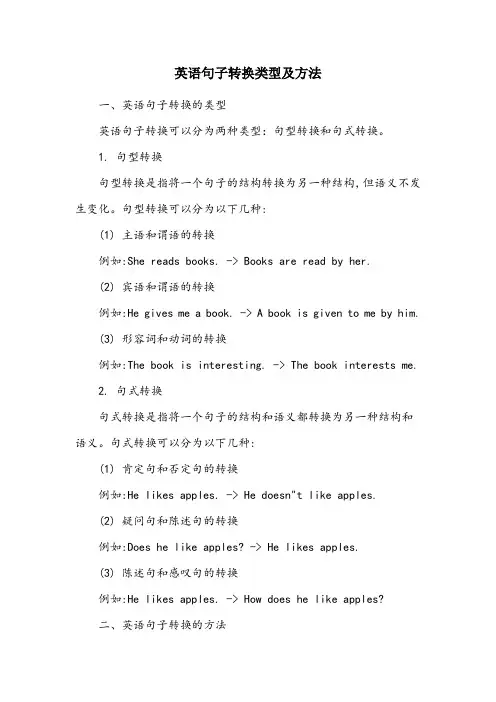
英语句子转换类型及方法
一、英语句子转换的类型
英语句子转换可以分为两种类型:句型转换和句式转换。
1. 句型转换
句型转换是指将一个句子的结构转换为另一种结构,但语义不发生变化。
句型转换可以分为以下几种:
(1) 主语和谓语的转换
例如:She reads books. -> Books are read by her.
(2) 宾语和谓语的转换
例如:He gives me a book. -> A book is given to me by him.
(3) 形容词和动词的转换
例如:The book is interesting. -> The book interests me.
2. 句式转换
句式转换是指将一个句子的结构和语义都转换为另一种结构和
语义。
句式转换可以分为以下几种:
(1) 肯定句和否定句的转换
例如:He likes apples. -> He doesn"t like apples.
(2) 疑问句和陈述句的转换
例如:Does he like apples? -> He likes apples.
(3) 陈述句和感叹句的转换
例如:He likes apples. -> How does he like apples?
二、英语句子转换的方法
英语句子转换的方法可以分为两种:语法转换和语义转换。
1. 语法转换
语法转换是指通过改变句子的语法结构来实现句子的转换。
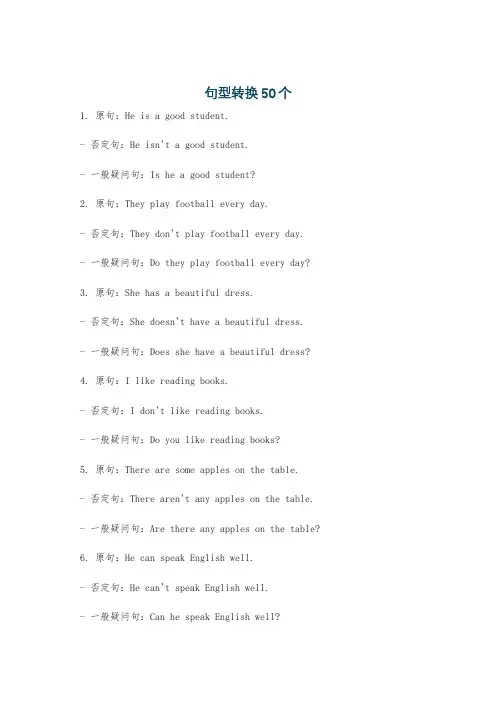
句型转换50个1. 原句:He is a good student.- 否定句:He isn't a good student.- 一般疑问句:Is he a good student?2. 原句:They play football every day.- 否定句:They don't play football every day.- 一般疑问句:Do they play football every day?3. 原句:She has a beautiful dress.- 否定句:She doesn't have a beautiful dress.- 一般疑问句:Does she have a beautiful dress?4. 原句:I like reading books.- 否定句:I don't like reading books.- 一般疑问句:Do you like reading books?5. 原句:There are some apples on the table.- 否定句:There aren't any apples on the table. - 一般疑问句:Are there any apples on the table?6. 原句:He can speak English well.- 否定句:He can't speak English well.- 一般疑问句:Can he speak English well?7. 原句:My mother made a cake yesterday.- 否定句:My mother didn't make a cake yesterday.- 一般疑问句:Did your mother make a cake yesterday?8. 原句:We will go to the park tomorrow.- 否定句:We won't go to the park tomorrow.- 一般疑问句:Will you go to the park tomorrow?9. 原句:The boy is running fast.- 否定句:The boy isn't running fast.- 一般疑问句:Is the boy running fast?10. 原句:She was at home last night.- 否定句:She wasn't at home last night.- 一般疑问句:Was she at home last night?11. 原句:They have been to Beijing.- 否定句:They haven't been to Beijing.- 一般疑问句:Have they been to Beijing?12. 原句:He had a great time at the party.- 否定句:He didn't have a great time at the party. - 一般疑问句:Did he have a great time at the party?13. 原句:I will be a teacher in the future.- 否定句:I won't be a teacher in the future.- 一般疑问句:Will you be a teacher in the future?14. 原句:There is a lot of water in the glass.- 否定句:There isn't a lot of water in the glass.- 一般疑问句:Is there a lot of water in the glass?15. 原句:She reads English every morning.- 否定句:She doesn't read English every morning.- 一般疑问句:Does she read English every morning?16. 原句:They are going to have a party this weekend.- 否定句:They aren't going to have a party this weekend. - 一般疑问句:Are they going to have a party this weekend?17. 原句:He does his homework carefully.- 否定句:He doesn't do his homework carefully.- 一般疑问句:Does he do his homework carefully?18. 原句:I saw a movie last week.- 否定句:I didn't see a movie last week.- 一般疑问句:Did you see a movie last week?19. 原句:We have a lot of homework to do.- 否定句:We don't have a lot of homework to do.- 一般疑问句:Do you have a lot of homework to do?20. 原句:The cat is sleeping under the tree.- 否定句:The cat isn't sleeping under the tree.- 一般疑问句:Is the cat sleeping under the tree?21. 原句:She will write a letter soon.- 否定句:She won't write a letter soon.- 一般疑问句:Will she write a letter soon?22. 原句:There were some people in the room.- 否定句:There weren't any people in the room.- 一般疑问句:Were there any people in the room?23. 原句:He has lived here for five years.- 否定句:He hasn't lived here for five years.- 一般疑问句:Has he lived here for five years?24. 原句:I am reading an interesting book.- 否定句:I'm not reading an interesting book.- 一般疑问句:Are you reading an interesting book?25. 原句:They played basketball yesterday afternoon.- 否定句:They didn't play basketball yesterday afternoon. - 一般疑问句:Did they play basketball yesterday afternoon?26. 原句:She can dance beautifully.- 否定句:She can't dance beautifully.- 一般疑问句:Can she dance beautifully?27. 原句:My father bought a new car last month.- 否定句:My father didn't buy a new car last month.- 一般疑问句:Did your father buy a new car last month?28. 原句:We are going to see a film tonight.- 否定句:We aren't going to see a film tonight.- 一般疑问句:Are you going to see a film tonight?29. 原句:There is some milk in the fridge.- 否定句:There isn't any milk in the fridge.- 一般疑问句:Is there any milk in the fridge?30. 原句:He likes playing the guitar.- 否定句:He doesn't like playing the guitar.- 一般疑问句:Does he like playing the guitar?31. 原句:I have finished my work.- 否定句:I haven't finished my work.- 一般疑问句:Have you finished your work?32. 原句:They were watching TV at eight o'clock last night.- 否定句:They weren't watching TV at eight o'clock last night. - 一般疑问句:Were they watching TV at eight o'clock last night?33. 原句:She will go shopping tomorrow.- 否定句:She won't go shopping tomorrow.- 一般疑问句:Will she go shopping tomorrow?34. 原句:There are five students in the classroom.- 否定句:There aren't five students in the classroom.- 一般疑问句:Are there five students in the classroom?35. 原句:He has a pet dog.- 否定句:He doesn't have a pet dog.- 一般疑问句:Does he have a pet dog?36. 原句:I am going to visit my grandparents this weekend.- 否定句:I'm not going to visit my grandparents this weekend.- 一般疑问句:Are you going to visit your grandparents this weekend?37. 原句:They have seen that movie.- 否定句:They haven't seen that movie.- 一般疑问句:Have they seen that movie?38. 原句:She was reading a novel when I came in.- 否定句:She wasn't reading a novel when I came in.- 一般疑问句:Was she reading a novel when you came in?39. 原句:He will be back soon.- 否定句:He won't be back soon.- 一般疑问句:Will he be back soon?40. 原句:There were some books on the desk.- 否定句:There weren't any books on the desk.- 一般疑问句:Were there any books on the desk?41. 原句:I can play the piano.- 否定句:I can't play the piano.- 一般疑问句:Can you play the piano?42. 原句:My mother cooks delicious food.- 否定句:My mother doesn't cook delicious food.- 一般疑问句:Does your mother cook delicious food?43. 原句:We had a party last weekend.- 否定句:We didn't have a party last weekend.- 一般疑问句:Did you have a party last weekend?44. 原句:She is going to sing a song at the concert.- 否定句:She isn't going to sing a song at the concert. - 一般疑问句:Is she going to sing a song at the concert?45. 原句:He has read this book twice.- 否定句:He hasn't read this book twice.- 一般疑问句:Has he read this book twice?46. 原句:I saw him in the park yesterday.- 否定句:I didn't see him in the park yesterday.- 一般疑问句:Did you see him in the park yesterday?47. 原句:They will build a new house next year.- 否定句:They won't build a new house next year.- 一般疑问句:Will they build a new house next year?48. 原句:There is a big tree in front of my house.- 否定句:There isn't a big tree in front of my house.- 一般疑问句:Is there a big tree in front of your house?49. 原句:She likes wearing skirts.- 否定句:She doesn't like wearing skirts.- 一般疑问句:Does she like wearing skirts?50. 原句:I am a doctor.- 否定句:I'm not a doctor.- 一般疑问句:Are you a doctor?。

句子的转换有多少种形式文章一:句子的转换有多少种形式?对于句子的转换,我们可以采用多种形式,通过不同的方法改变原有的句子结构,以达到表达更加准确、生动的效果。
下面列出三个知识点并进行分析。
1. 句型转换的目的与方法句子的转换是为了表达更加准确、复杂的含义,或者为了让同一种表达方式更加生动、具有表现力。
句型转换的方法主要有以下几种:(1)主动变被动:通过将原有句子中的主语变为被动语态的主语,来表达出被动的意义。
例如,“Tom opened the door”可以转换为“The door was opened by Tom”。
(2)疑问变陈述:通过将原有疑问句中的语气改为陈述句,来表达出强烈的肯定或否定的意义。
例如,“Do you like pizza?”可以转换为“I like pizza”。
(3)倒装句:通过将原有句子中的谓语动词与主语倒置,来表达出强调、反问等意义。
例如,“I have never seen such a beautiful girl”可以转换为“Never have I seen such a beautiful girl”。
2. 句型转换的适用场景句型转换的适用场景主要有以下几种:(1)表达强调:通过强调某个词语或句子成分,来表达出强烈的情感或意义。
例如,“I didn't say you were crazy”可以通过倒装句,强调“you were crazy”,以表达出强烈的否定意义。
(2)表达比较:通过将原有句子中的成分进行比较,来表达出事物之间的差异或相似之处。
例如,“I like coffee more than tea”可以转换为“Tea is not as good as coffee”,以表达出两种饮料之间的比较。
(3)表达变化:通过改变句子中的时态、语态等成分,来表达出事物的变化趋势或发展方向。
例如,“He has been studying English for three years”可以转换为“He started studying English three years ago”,以表达出他学习英语的起点和变化趋势。
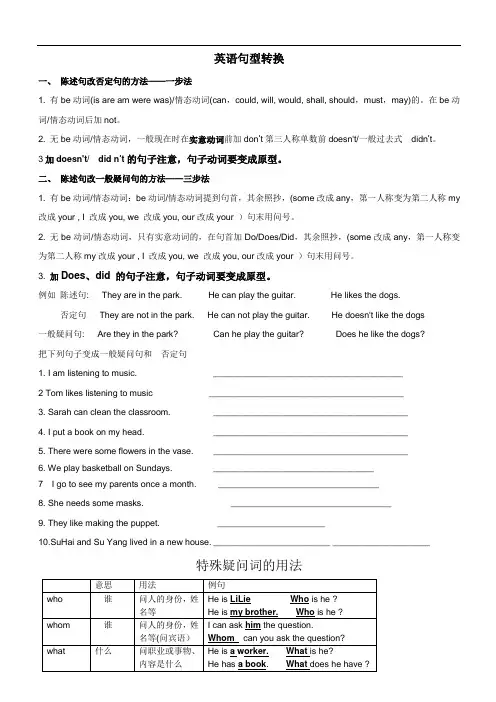
英语句型转换一、 陈述句改否定句的方法——一步法 1. 有 be 动词(is are am were was)/情态动词(can,could, will, would, shall, should,must,may)的。
在 be 动 词/情态动词后加 not。
2. 无 be 动词/情态动词,一般现在时在实意动词前加 don’t 第三人称单数前 doesn't/一般过去式 didn’t。
3 加 doesn't/ did n’t 的句子注意,句子动词要变成原型。
二、 陈述句改一般疑问句的方法——三步法 1. 有 be 动词/情态动词:be 动词/情态动词提到句首,其余照抄,(some 改成 any,第一人称变为第二人称 my 改成 your , I 改成 you, we 改成 you, our 改成 your )句末用问号。
2. 无 be 动词/情态动词,只有实意动词的,在句首加 Do/Does/Did,其余照抄,(some 改成 any,第一人称变 为第二人称 my 改成 your , I 改成 you, we 改成 you, our 改成 your )句末用问号。
3. 加 Does、did 的句子注意,句子动词要变成原型。
例如 陈述句: 否定句 一般疑问句: They are in the park. They are not in the park. Are they in the park? He can play the guitar. He can not play the guitar. Can he play the guitar? He likes the dogs. He doesn't like the dogs Does he like the dogs?把下列句子变成一般疑问句和 否定句 1. I am listening to music. 2 Tom likes listening to music 3. Sarah can clean the classroom. 4. I put a book on my head. 5. There were some flowers in the vase. 6. We play basketball on Sundays. 7 I go to see my parents once a month. 8. She needs some masks. 9. They like making the puppet. _______________________________________ ________________________________________ ________________________________________ ________________________________________ ________________________________________ _________________________________ _________________________________ _________________________________ ______________________10.SuHai and Su Yang lived in a new house. ________________________ ____________________特殊疑问词的用法意思 who whom what 谁 谁 什么 用法 问人的身份,姓 名等 问人的身份,姓 名等(问宾语) 例句 He is LiLie He is my brother. Who is he ? Who is he ?I can ask him the question. Whom can you ask the question? What is he? What does he have ?问职业或事物、 He is a worker. 内容是什么 He has a book.which哪一个问一定范围内 特指的人或物 问所属关系The big box is mine. Which box is yours? The girl at the door is Ann. Which girl is Ann? This is her book. Whose book is this ? This book is hers. Whose is this book?whose what color What time when where why how谁的 什么颜色 几点 什么时候 什么地方 为什么 怎样问颜色(表语) My skirt is red. What color is your skirt? 问具体时间 问大致时间 We play games at five in the afternoon ? What time do you play games? We play games in the afternoon ? When do you play games?问地点(状语) We play games at home on Sunday ? Where do you play games on Sunday? 问原因 问健康状况、 做事的方式等 问年龄 跟复数名词, 问数量 跟不可数名词 问数量或价钱 问路程 问 in+一段时间 问一段时间, 问物体的长短 He isn't at school today because he is ill. Why isn't he at school today ? He is fine/strong. How is he ? I go home by bike. How do you go home? He is ten. How old is he ? There are thirty boys in my class. How many boys are there in your class? There is some milk in the bottle. How much milk is there in the bottle? It's five kilometers away from here? How far is it from here? He can finish it in half an hour. How soon can he finish it ? He has lived here for a year. How long has he lived here? The desk is one meters long. How long is the desk ? I go to see my parents once a month. How often do you go to see your parents?how old how many how much how far how soon how long多大几岁 多少 多少 多远 多快,多 久 多久how often多久 (一次)问频率How 的疑问句辨析 一、how many 和 how much 的区别 how many 用来询问可数名词的数量,它的句式是:How many+复数名词+一般疑问句+? how much 用来询问不可数名词的数量,也可询问价格。
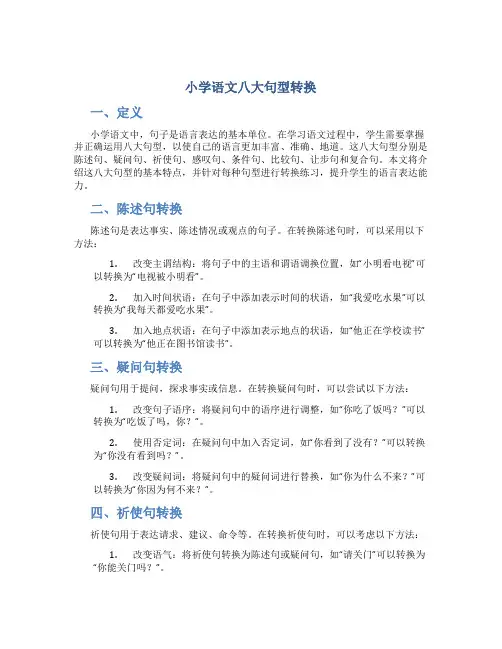
小学语文八大句型转换一、定义小学语文中,句子是语言表达的基本单位。
在学习语文过程中,学生需要掌握并正确运用八大句型,以使自己的语言更加丰富、准确、地道。
这八大句型分别是陈述句、疑问句、祈使句、感叹句、条件句、比较句、让步句和复合句。
本文将介绍这八大句型的基本特点,并针对每种句型进行转换练习,提升学生的语言表达能力。
二、陈述句转换陈述句是表达事实、陈述情况或观点的句子。
在转换陈述句时,可以采用以下方法:1.改变主谓结构:将句子中的主语和谓语调换位置,如“小明看电视”可以转换为“电视被小明看”。
2.加入时间状语:在句子中添加表示时间的状语,如“我爱吃水果”可以转换为“我每天都爱吃水果”。
3.加入地点状语:在句子中添加表示地点的状语,如“他正在学校读书”可以转换为“他正在图书馆读书”。
三、疑问句转换疑问句用于提问,探求事实或信息。
在转换疑问句时,可以尝试以下方法:1.改变句子语序:将疑问句中的语序进行调整,如“你吃了饭吗?”可以转换为“吃饭了吗,你?”。
2.使用否定词:在疑问句中加入否定词,如“你看到了没有?”可以转换为“你没有看到吗?”。
3.改变疑问词:将疑问句中的疑问词进行替换,如“你为什么不来?”可以转换为“你因为何不来?”。
四、祈使句转换祈使句用于表达请求、建议、命令等。
在转换祈使句时,可以考虑以下方法:1.改变语气:将祈使句转换为陈述句或疑问句,如“请关门”可以转换为“你能关门吗?”。
2.使用否定词:在祈使句中加入否定词,如“请不要打扰我”可以转换为“你能不要打扰我吗?”。
3.改变质疑方式:将祈使句中的建议或请求转换为质疑方式,如“请保持安静”可以转换为“难道你不应该保持安静吗?”。
五、感叹句转换感叹句用于表达惊讶、欣喜、赞叹等情感。
在转换感叹句时,可以尝试以下方法:1.改变程度词:将感叹句中的程度词进行替换,如“多么美丽的花啊!”可以转换为“真是美丽的花啊!”。
2.添加原因状语:在感叹句中加入表示原因的状语,如“这么好吃的蛋糕!”可以转换为“这个蛋糕真好吃呀!”。

句型转换规则归纳-CAL-FENGHAI.-(YICAI)-Company One1句型转换规则归纳1.含有be动词(am, is, are)的句子,改为否定句是在be动词后面加not,原来句子中的some改为any; 改为一般疑问句的时候,将be动词直接放到句子的最前面,原来句子中的some改为any,句号改为问号。
((如果主语是第一人称则变成第二人称))1)There is a house in the forest. (肯定句)There is not a house in the forest. (否定句) is not=isn’tIs there a house in the forest(一般疑问句)2)There are some classrooms in the school. (肯定句)There are not any classrooms in the school. (否定句) are not=aren’tAre there any classrooms in the school(一般疑问句)3) I am a new student. (肯定句)I am not a new student. (否定句) am not没有缩写形式Are you a new student (一般疑问句)(主语是第一人称I时,改为一般疑问句时主语要变为第二人称you)2.含有情态动词如:can, may ,must, would,should ,could, will 的句子,改否定句时直接在情态动词后面加not, 原来句子中的some改为any; 改为一般疑问句的时候,将情态动词直接放到句子的最前面,原来句子中的some改为an y,句号改为问号。
((如果主语是第一人称则变成第二人称))1)I can play basketball. (肯定句)I can not play basketball. (否定句) can not = can’tCan you play basketball(一般疑问句)3.不含有be动词,也没有情态动词的句子,改为否定句的时候需要借助助动词don’t和doesn’t来否定,原来句子中的some改为any; 改为一般疑问句的时候需要借助Do, Does来提问,原来句子中的some改为any,句号改问号。
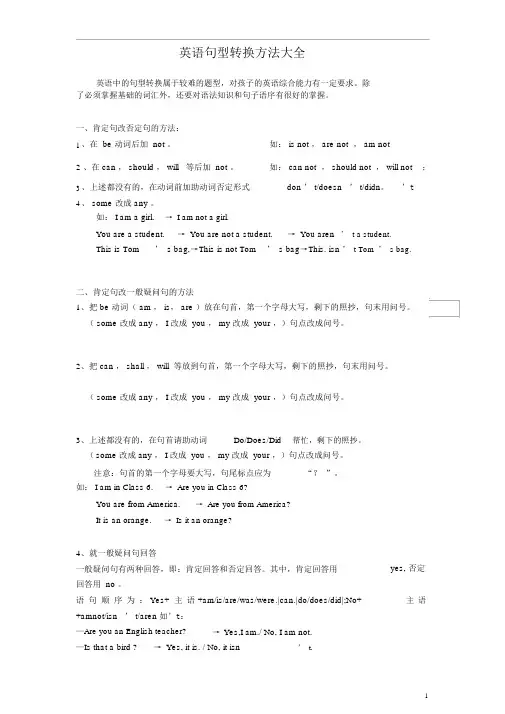
英语句型转换方法大全英语中的句型转换属于较难的题型,对孩子的英语综合能力有一定要求。
除了必须掌握基础的词汇外,还要对语法知识和句子语序有很好的掌握。
一、肯定句改否定句的方法:1、在 be 动词后加 not 。
如: is not , are not , am not2 、在 can , should , will等后加 not 。
如: can not , should not , will not;3、上述都没有的,在动词前加助动词否定形式don ’ t/doesn ’ t/didn。
’t4、 some 改成 any 。
如: I am a girl.→ I am not a girl.You are a student.→ You are not a student.→ You aren’ t a student.This is Tom’ s bag,→This is not Tom’ s bag→This. isn’ t Tom’ s bag.二、肯定句改一般疑问句的方法1、把 be 动词( am , is, are )放在句首,第一个字母大写,剩下的照抄,句末用问号。
( some 改成 any , I 改成 you , my 改成 your ,)句点改成问号。
2、把 can , shall , will 等放到句首,第一个字母大写,剩下的照抄,句末用问号。
( some 改成 any , I 改成 you , my 改成 your ,)句点改成问号。
3、上述都没有的,在句首请助动词Do/Does/Did帮忙,剩下的照抄。
(some 改成 any , I 改成 you , my 改成 your ,)句点改成问号。
注意:句首的第一个字母要大写,句尾标点应为“?”。
如: I am in Class 6.→ Are you in Class 6?You are from America.→ Are you from America?It is an orange.→ Is it an orange?4、就一般疑问句回答一般疑问句有两种回答,即:肯定回答和否定回答。
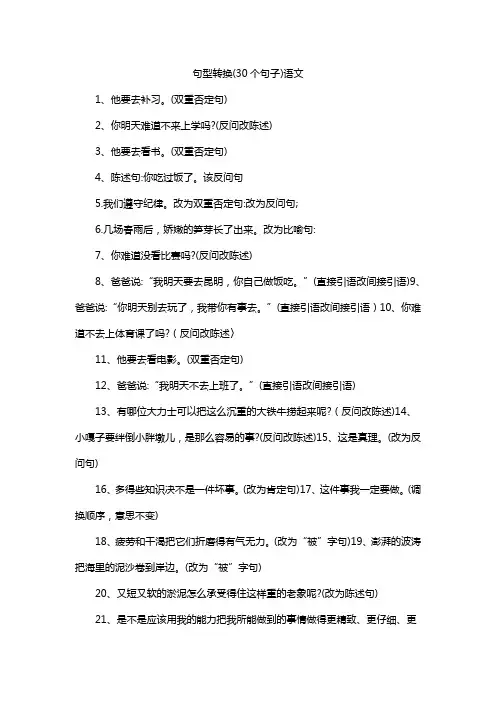
句型转换(30个句子)语文1、他要去补习。
(双重否定句)2、你明天难道不来上学吗?(反问改陈述)3、他要去看书。
(双重否定句)4、陈述句:你吃过饭了。
该反问句5.我们遵守纪律。
改为双重否定句:改为反问句;6.几场春雨后,娇嫩的笋芽长了出来。
改为比喻句:7、你难道没看比赛吗?(反问改陈述)8、爸爸说:“我明天要去昆明,你自己做饭吃。
”(直接引语改间接引语)9、爸爸说:“你明天别去玩了,我带你有事去。
”(直接引语改间接引语)10、你难道不去上体育课了吗?(反问改陈述〉11、他要去看电影。
(双重否定句)12、爸爸说:“我明天不去上班了。
”(直接引语改间接引语)13、有哪位大力士可以把这么沉重的大铁牛捞起来呢?(反问改陈述)14、小嘎子要绊倒小胖墩儿,是那么容易的事?(反问改陈述)15、这是真理。
(改为反问句)16、多得些知识决不是一件坏事。
(改为肯定句)17、这件事我一定要做。
(调换顺序,意思不变)18、疲劳和干渴把它们折磨得有气无力。
(改为“被”字句)19、澎湃的波涛把海里的泥沙卷到岸边。
(改为“被”字句)20、又短又软的淤泥怎么承受得住这样重的老象呢?(改为陈述句)21、是不是应该用我的能力把我所能做到的事情做得更精致、更仔细、更加一丝不苟呢?(改为陈述句)22、多读多练,作文会进步。
(用关联词语把句子连起来)23、他的学习成绩很好,很自私,算不上好学生。
(用关联词语把句子连起来)24、如果胜利不属于这样的队伍,还会属于谁呢?(改为不用关联词表示肯定的陈述句)25、这是英雄的中国人民坚强不屈的声音!(改为反问句)26、他热情地和我握了握手,说:“我的国语讲得不好,是初学的。
”(改为不用引号的转述)27、这难道不是伟大的奇观么?(改为陈述句)28、我在星星的怀抱中微笑着。
(改变句序,句子意思不变)29、不劳动,连棵花也养不活,这难道不是真理吗?(改为陈述句)30、多得些知识不是坏事。
(改为反问句)30、多得些知识不是坏事。
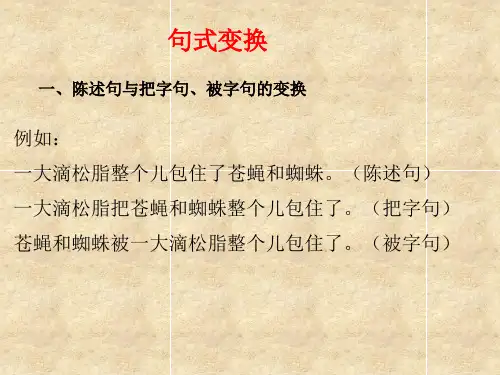
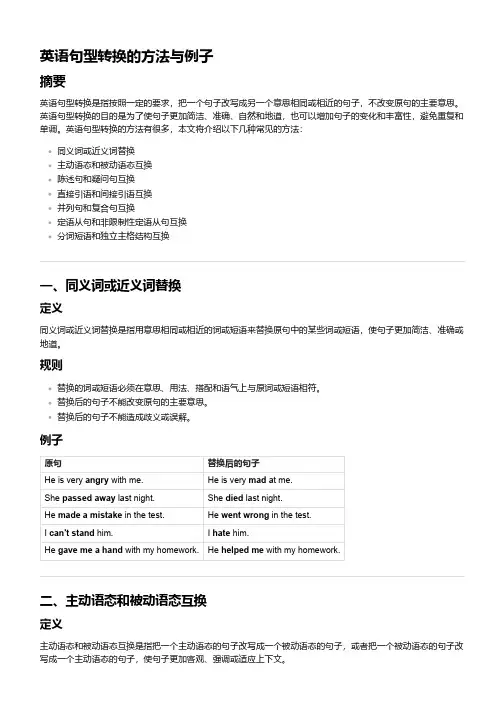
英语句型转换的方法与例子摘要英语句型转换是指按照一定的要求,把一个句子改写成另一个意思相同或相近的句子,不改变原句的主要意思。
英语句型转换的目的是为了使句子更加简洁、准确、自然和地道,也可以增加句子的变化和丰富性,避免重复和单调。
英语句型转换的方法有很多,本文将介绍以下几种常见的方法:同义词或近义词替换主动语态和被动语态互换陈述句和疑问句互换直接引语和间接引语互换并列句和复合句互换定语从句和非限制性定语从句互换分词短语和独立主格结构互换一、同义词或近义词替换定义同义词或近义词替换是指用意思相同或相近的词或短语来替换原句中的某些词或短语,使句子更加简洁、准确或地道。
规则替换的词或短语必须在意思、用法、搭配和语气上与原词或短语相符。
替换后的句子不能改变原句的主要意思。
替换后的句子不能造成歧义或误解。
例子原句替换后的句子He is very angry with me.He is very mad at me.She passed away last night.She died last night.He made a mistake in the test.He went wrong in the test.I can't stand him.I hate him.He gave me a hand with my homework.He helped me with my homework.二、主动语态和被动语态互换定义主动语态和被动语态互换是指把一个主动语态的句子改写成一个被动语态的句子,或者把一个被动语态的句子改写成一个主动语态的句子,使句子更加客观、强调或适应上下文。
规则主动语态变被动语态时,要把原主语变成by短语放在被动语态谓语之后,把原宾语变成新主语放在被动语态谓语之前,把原谓语动词变成被动形式(即be+过去分词),并保持时态、人称和数一致。
被动语态变主动语态时,要把原by短语去掉,把原主语变成新宾语放在主动谓语之后,把原谓语动词变成主动形式,并保持时态、人称和数一致。
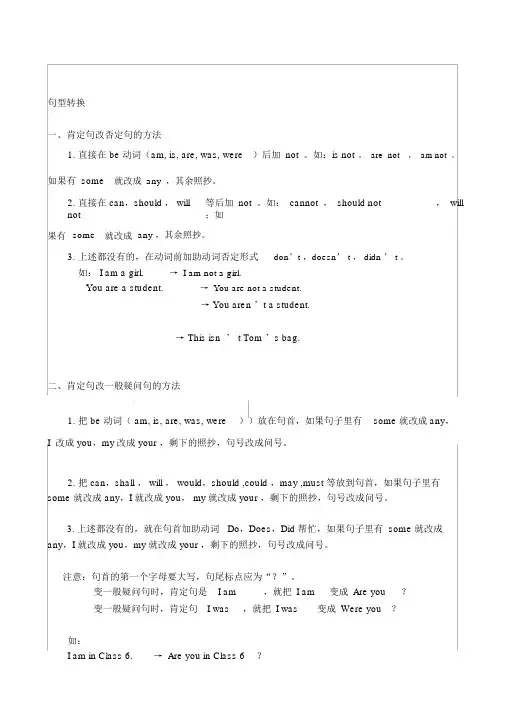
句型转换一、肯定句改否定句的方法1. 直接在 be 动词(am, is, are, was, were)后加not。
如:is not,are not,am not。
如果有 some就改成any,其余照抄。
2. 直接在 can,should , will等后加not。
如:cannot,should not,willnot;如果有some就改成any ,其余照抄。
3. 上述都没有的,在动词前加助动词否定形式don’t ,doesn’ t , didn ’ t 。
如: I am a girl.→ I am not a girl.You are a student.→ You are not a student.→ You aren ’t a student.→This isn ’ t Tom ’s bag.二、肯定句改一般疑问句的方法1. 把 be 动词( am, is, are, was, were))放在句首,如果句子里有some 就改成 any,I改成 you,my改成 your ,剩下的照抄,句号改成问号。
2.把 can,shall , will , would,should ,could ,may ,must 等放到句首,如果句子里有some 就改成 any,I 就改成 you, my就改成 your ,剩下的照抄,句号改成问号。
3.上述都没有的,就在句首加助动词 Do,Does,Did 帮忙,如果句子里有 some 就改成any,I 就改成 you,my就改成 your ,剩下的照抄,句号改成问号。
注意:句首的第一个字母要大写,句尾标点应为“?”。
变一般疑问句时,肯定句是I am,就把I am变成Are you?变一般疑问句时,肯定句I was,就把I was变成Were you?如:I am in Class 6.→ Are you in Class 6?You are from America.→Are you from America ?It is an orange.→ Is it an orange?4. 就一般疑问句回答一般疑问句有两种回答,即:肯定回答和否定回答。
语文句型转换方法
语文句型转换,指的是将语文中的句子从一种形式转换为另一种形式,使其表达方式更加多样化和灵活。
以下是一些常见的语文句型转换方法:
1. 主谓结构转换为倒装结构:
原句:他在操场上跑步。
倒装结构:在操场上跑步的是他。
2. 主谓结构转换为被动语态:
原句:杰克吃了苹果。
被动语态:苹果被杰克吃了。
3. 肯定句转换为否定句:
原句:他每天都看书。
否定句:他每天都不看书。
4. 陈述句转换为疑问句:
原句:他是一位医生。
疑问句:他是一位医生吗?
5. 肯定句转换为感叹句:
原句:今天天气真好!
感叹句:今天的天气真好啊!
6. 直接引语转换为间接引语:
原句:小明说:“我喜欢吃巧克力。
”
间接引语:小明说他喜欢吃巧克力。
7. 使用虚拟语气:
原句:要是我有时间,我就去看电影。
虚拟语气:要是我有时间,我就去看电影了。
8. 简单句转换为复合句:
原句:我今天去了图书馆。
复合句:我今天去了图书馆,想借几本书回来看。
9. 使用比较级和最高级:
原句:这本书很好看。
比较级:这本书比那本更好看。
最高级:这本书是我看过的最好看的。
10. 使用省略句:
原句:我喜欢吃冰激凌,(而)且我喜欢巧克力口味的。
省略句:我喜欢吃冰激凌,且喜欢巧克力口味的。
以上是关于语文句型转换的一些常见方法,通过句型转换,可以让语文表达更加灵活多样,增强语言的表达能力。
句型转换动词第三人称单数--三单变化和名词复数变化1.直接加 s 。
2.以 o,h 结尾的加 es 。
3.以 y 结尾的去y 加 ies 。
动词的ing形式变化1.直接加 ing 。
2.以e 结尾的去e 加ing 。
3.双写结尾字母加 ing 。
一、肯定句变否定句。
1.直接在原来句子中的be动词(am,is,are )和情态动词can/should/will/must的后面加 not 。
2.无be 无can/should/will/must ,在动词前添加 don’t 或doesn’t .I going to the bookstore.2.He is going to buy some word books.He going to buy some word books.3.She is watching TV now.She watching TV now.4.They are going to drow some picpures.They going to drow some picpures.5.I can run.I run.6. I like dancing.I dancing.7. He reads books.He books.8.We go to school on Sunday . We to school on Sunday.9.Tom often walks to school.Tom often to school.二、肯定句变一般疑问句。
1.把原来句子中的be动词( is,are )和情态动词can移到第一个位子,其它照抄。
注意每个句子的首字母要大写。
2.有be/can 的把be/can提前到第一个单词,无can无be 时第一个单词填Do/Does 。
不能有WH特殊疑问词。
注意:肯定句里的I/my变成疑问句时是 you/your ,肯定句的am 变成疑问句是 are 。
句型转换是什么句子类型的词语文章一:句型转换是什么句子类型的词语一、什么是句型转换?句型转换指在不改变句子意思的情况下,将一种句型转换成另一种句型。
常见的句型转换包括:陈述句转换成疑问句、否定句、条件句等,疑问句转换成陈述句、祈使句等。
句型转换是语法知识的重要内容之一,也是英语学习中难度较大的部分之一。
二、句型转换属于哪种类型的句子?句型转换不属于某种具体的句子类型,而是一种语法操作。
在英语中,根据句子的结构和目的,可分为七种基本句型,分别是:S+V、S+V+O、S+V+C、S+V+IO+DO、S+V+DO、S+V+O+O和S+V+O+OC。
通过句型转换,同一个句子可以变成这七种不同的句型之一。
三、句型转换的技巧与注意事项1. 在转换句子时要保证句意不变,例如:He plays basketball every day. (陈述句) → Does he play basketball every day? (疑问句)。
在转换过程中,要注意动词时态、人称等的变化。
2. 句型转换需要根据不同的情形选择合适的变化方式。
例如,将"If it rains tomorrow, I will stay at home."转换为祈使句:"Stay at home if it rains tomorrow."。
3. 句型转换需要熟练掌握各种语法结构和变化规律。
例如,将"He is a student who studies hard."转换为倒装句:"Hard as he studies, he is a student."。
在英语学习中,句型转换是提高语言能力的重要一环,可以帮助学生建立稳固的语法基础,提升语言综合运用能力。
文章二:句型转换中常用的短语和词语一、常用的短语和词语句型转换中常用的短语和词语有很多,下面列出一些常见的:1. 对照句型:通过对比两个不同语言形式的句子,帮助学生快速记忆句型的变化规律。
1、您为我们付出了这样高的代价,难道还不足以表达您对中国人民的友谊?(改陈述句)2、离开朝鲜的那天,志愿军们不得不哭了!(改为肯定句)3、肚子饿了的时候,我们都得吃东西。
(改双重否定句)4、小刚对小李说:“你去拿足球,我去带同学下来。
”(改为转述句)5、老师慈祥的笑容时刻浮现在我们眼前。
(缩句)6、由于非常突然的原因,狮王不得不和老虎开战。
改成肯定句:7、婚礼两周后就要开始了,慢的出奇的乌龟哪能赶得上?改成肯定句:8、我会准时赶到那里。
改成双重否定句:改成反问句:1、我们怎么能随意砍伐树木,破坏绿化呢?(改成陈述句)2、这件事不能不让人高兴。
(改为肯定句)3、小杰悄悄地告诉小力说:“这件事情是我和小民一起做的。
”(改为间接转述句)4、小青在操场上找到了丢失的钢笔。
(改为“把”字句和“被”字句)5、对违法乱纪的现象我们一定要严惩。
(改为反问句)6、太阳升起。
(扩句)7、年轻的妈妈的眼色里开始流露出希望的喜悦。
(缩句)8、别人能做到的事,我也能做到。
(改为反问句)9、字典难道不是我们的良师益友吗?(改为陈述句)10、赵王告诉蔺相如,要蔺相如带着宝玉到秦国去。
(改为直接叙述句)11、小方说:“不行,我的字写得不够好,应该让小宇去参加比赛。
”(改为间接叙述句)12、我班被评为先进班集体,全班同学个个感到自豪。
(肯定句变为否定句)13、他是一个好学生。
(陈述句改为感叹句)14、难道那条街不热闹吗?(反问句改为陈述句)15、王兰告诉老师:“我叫王兰,是从上海转来的。
”(改为转述句)16、这万里长城,难道不是凝结着古代劳动人民的血汗吗?(改为陈述句)17、我知道你便秘。
(改为反问)1、您为我们付出了这样高的代价,难道还不足以表达您对中国人民的友谊?(改陈述句)2、离开朝鲜的那天,志愿军们不得不哭了!(改为肯定句)3、肚子饿了的时候,我们都得吃东西。
(改双重否定句)4、小刚对小李说:“你去拿足球,我去带同学下来。
句型练习
一、改为陈述句:
1、这难道不是你的作业本吗?
2、不劳动,连棵花也养不活,这难道不是真理吗?
3、难道你不用蜡烛就不行吗?
4、难道他会从柴房里搬来一窝兔子吗?
5、这比山还高比海还深的情谊,我们怎能忘怀?
6、都是你自找的,我怎么能帮得了忙?
7、秦王我都不怕,会怕廉将军吗?
8、遇到困难,我们难道应该退缩吗?
二、改为反问句:
1、这里的景色非常迷人。
2、我的幼稚的心灵中却充满了和大人不同的想法。
3、这比山还高比海还深的情谊,我们不能忘怀。
4、一个梦想,会有这么大的力量,谁都会感动。
5、字典是我们无声的老师。
三、改双重否定句
1、秦王被逼得没法,只好敲了一下缶。
2、想让身体健壮,必须加强锻炼。
3、犯罪分子在铁证面前,只好低下了头。
句型转换大全及答案语文一、句型转换介绍句型转换是语文学习中一个重要的知识点,通过改变句子的结构和方式,达到表达意思的不同目的。
掌握句型转换可以丰富语言表达,提升写作能力。
在语文学习中,常见的句型转换包括主谓互换、改变句子成分、改变句子的语态、改变句子的时态等。
二、句型转换示例下面是一些常见的句型转换示例及其答案:1. 主谓互换示例一:原句:小明正在做作业。
转换句:作业正在被小明做。
示例二:原句:他喜欢音乐。
转换句:音乐是他喜欢的。
2. 改变句子成分示例一:原句:这本书是我妈妈买的。
转换句:我妈妈买了这本书。
示例二:原句:他是一个好学生。
转换句:一个好学生就是他。
3. 改变句子的语态示例一:原句:他们正在讨论这个问题。
转换句:这个问题正在被他们讨论。
示例二:原句:我们将组织一次演讲比赛。
转换句:一次演讲比赛将被我们组织。
4. 改变句子的时态示例一:原句:他明天要去上海。
转换句:他后天将去上海。
示例二:原句:昨天我买了一条裙子。
转换句:明天我将去买一条裙子。
三、句型转换答案解析1. 主谓互换主谓互换是将原句中的主语和谓语进行位置调换。
例如,原句“小明正在做作业”,转换句“作业正在被小明做”。
这样的转换可以突出行为或事物,丰富句子表达。
2. 改变句子成分改变句子成分是通过改变句子中的词语位置或者将其中的部分词语进行省略、替换等方式进行转换。
例如,原句“这本书是我妈妈买的”,转换句“我妈妈买了这本书”。
这样的转换可以使句子更加简洁明了。
3. 改变句子的语态改变句子的语态是通过改变句子中的谓语动词形式,将主动语态转换为被动语态,或者将被动语态转换为主动语态。
例如,原句“他们正在讨论这个问题”,转换句“这个问题正在被他们讨论”。
这样的转换可以使句子的焦点发生变化,突出动作的承受者。
4. 改变句子的时态改变句子的时态是通过改变句子中动词的时态形式,转换句子的时间概念。
例如,原句“他明天要去上海”,转换句“他后天将去上海”。
初一英语下册动词的用法练习题
I. 用动词的正确形式填空:
1. - _____ Jack _______ (have)any bread ?
-No , he _______.
2. I _____ ______ any pears . (not have). But Mary ______ some . (have)
3. Maria ______ ______ any (not have)eggs.
4. _____ Alice and Tina ______ any fish ? No , they ______ . (have)
5. ______ Tom’s cat ______ milk ? No , it _______ . (like)
6. What ______ you _____ in your backpack ? (have)
7. ____ you _____ bananas ? (like)
8. This ____ my pen pal Jim . (be)
9. What language _______ you ______ ? (speak)
10. My mother ____ _____ TV now . (watch)
11. We _____ _______ Japanese at school . (not , study )
12. He _______ _______ playing football . (not , like)
13. What time ______ they usually ______ up ? (get)
14. ______ your father _____ in that factory ? (work)
II. 判断下面句子的正误,并改正。
1. Where do you from ? ( )
______________________
2. What kind of food does your mother like ? ( )
_________________________
3. I’m not live in Beijing . ( )
_________________________
4. My pen pal want to come here this September . ( )
_________________________
5. The twins doesn’t like thrillers . ( )
_________________________
6. My cousin don’t want to go to a movie . ( )
_________________________
7. Do your parents likes salad ? ( )
_________________________
8. Does Jim and Mary in the same class ? ( )
_________________________
III. 句型转换:
1. School starts at 8 o’clock in the morning . (改为一般疑问句)
____ school _____ at 8 o’clock in the morning ?
2. My grandpa does sports every day . (改为否定句)
My grandpa _____ ______ sports every day .
3. How do you go to school ? (完成答句)
I _____ to school by bike .
4. Lin Hai works hard . (改为否定句)
Lin Hai _____ _______ hard .
5. My pen pal comes from Brazil . (就划线部分提问)
______ ______ your pen pal ______ _______ ?
6. Maria can speak Chinese and French . (就划线部分提问)
______ ______ ______ Maria speak ?
7. Uncle Bob has a big apartment . (改为一般疑问句)
_____ Uncle Bob ______ a big apartment ?
8. My grandma likes rice and vegetables for dinner . (就划线部分提问) _______ _______ your grandma like for dinner ?
9. Rick likes math because he thinks it is interesting . (就划线部分提问) ______ ______ Rick _____ math ?
10. What time does Tom usually go to school ? (回答问题)
He usually _______ to school _______ 7 o’clock .
IV. 用括号中适当的词填空:
1. Li Mei usually ______ (come , coming , comes)to school early .
2. My English teacher ______ (is , plays , play)tennis well .
3. _____ (Is , Do , Does)there a cinema in this area (地区)?
4. _______(Are , Does , Do)they speak , English in Brazil ?
5. It _______ (isn’t , don’t , doesn’t )often snow in winter .
6. The girl _______ (go , goes , going)home at 4:30 in the afternoon .
V. 选择填空:
( )1. Tom is a worker . He _____ in a factory . His sisters _____ in a hospital.
A. work , work
B. works , work
C. work , works
( )2. Who ______ English best in your class ?
A. speak
B. speaks
C. speaking
( )3. We _______ music and often _____ to music .
A. like , listen
B. likes , listens
C. like , are listening
( )4. On Sunday he sometimes _____ his clothes and sometimes _____ some shopping.
A. wash , do
B. is washing , is doing
C. washes , does
( )5. The twins usually _______ milk and bread for breakfast , but Jim ______ some
oranges for it .
A. have , have
B. have , has
C. has , have
VI. 用括号中所给动词的适当形式填空:
Wang Lin 1 ______(be)a schoolboy . He 2_______ (live)in Beijing . He 3 _______(study)in a middle school.
Wang Lin 4 _______(get)up at half past five every day . After that he 5________ (read)English and Chinese . He 6________ (have)breakfast at seven . Wang Lin 7 ________(go) to school six days a week . In class he 8_______ (listen)to the teacher carefully and his teachers 9 ________(like)him very much .。